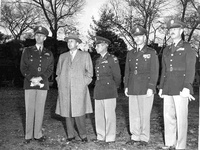And the undergraduates weren’t alone in feeling patriotism and obligation towards the war effort.
One of the top advisers to then-Unversity President James B. Conant ’14 was Grenville Clark, a former member of the Harvard Corporation, who graduated from the College in 1903.
In his 50-year class notes, he wrote about the Korean conflict, comparing that war to World War II.
“Both of these wartime efforts were purely of civilian origin and illustrate a long-felt conviction of mine—that in a crisis, the people, instead of relying upon a government must take the initiative themselves,” Clark wrote.
A Question of Policy
“When people look back at the ’50s and say that there was not much activism, part of it was related to the fact that everybody went into the service,” Greeley says.
“Our generation was fairly used to war,” says John H. Zentay ’53, a government concentrator in Lowell House, who was drafted a mere 20 days after graduation. “Our parents had been in the First World War...the beginning of our consciousness was Hitler and Germany.”
“Korea was sort of part of the progression, so it wasn’t that unusual,” he says.
Some professors debated, particularly in anticipation of the 1952 Eisenhower-Stevenson elections, what the U.S. should do in the “Asian conflict.”
The discussion was usually fairly technical, focusing on specific bits of military policy rather than the overarching questions of when and whether the U.S. should intervene in other countries.
Nearly everyone agreed that the United States was correct in taking action.
Zentay said only a few student groups, such as the Young Progressives, opposed the fighting.
“There were some on the fringe who objected to war because they thought that America was the imperalist nation fighting these wonderful communists,” Zentay says. “But that was a real left-wing fringe organization.”
The Young Progressives, which campaigned for a ceasefire, also defended communism. Their president asked that Harvard not automatically assume that the Communist Party is wrong. One of their major goals was getting the United States to recognize “red China.”
But Wagner, who became active in the anti-Vietnam movement by supporting senatorial candidates opposed to that war, said he could remember little active anti-war sentiment on campus during the Korean war.
Read more in News
Sikh’s Sword Seized By School













